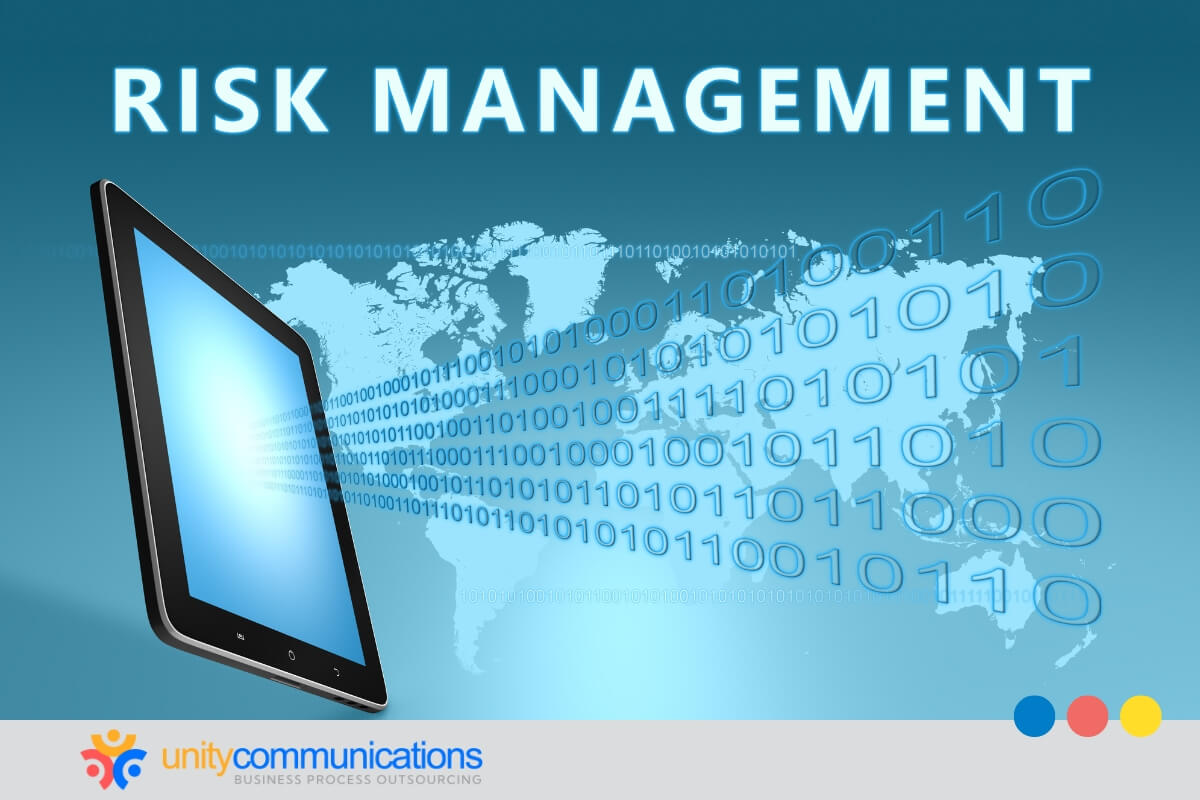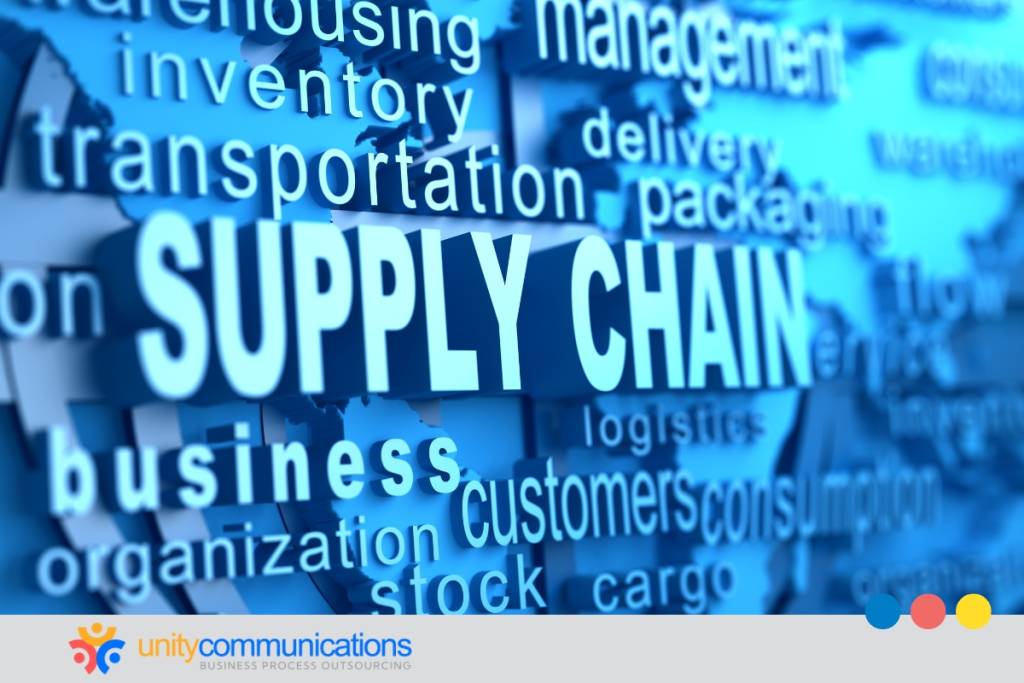Table of Contents
Global disruptions highlight the critical need for resilient supply chains. Companies increasingly recognize that traditional approaches to supply chain management are insufficient to withstand the complexities and uncertainties of today’s market environment.
As a result, business process outsourcing (BPO) becomes a pivotal strategy for enhancing supply chain resilience.
This article delves into how BPO fortifies supply chains against disruptions, ensuring stability and continuity in the face of adversity. It explores resilient supply chain strategies made possible through BPO.
Defining resilience in the supply chain

Supply chain resilience refers to the ability of a supply chain to anticipate, prepare for, respond to, and recover from disruptions while maintaining steady operations and meeting customer demand. It encompasses various strategies and practices designed to enhance the robustness and adaptability of supply chain performance.
Critical elements of supply chain resilience include:
- Risk management involves identifying potential risks and vulnerabilities within the supply chain and developing mitigation strategies.
- Flexibility and adaptability require adjusting operations, sources, and logistics quickly in response to unexpected changes or disruptions.
- Visibility and transparency necessitate having a clear and real-time view of the entire supply chain to detect and address issues promptly.
- Collaboration and communication ensure seamless operations among all supply chain leaders, including suppliers, manufacturers, and logistics providers.
- Diversification entails avoiding reliance on a single source for critical components or services by delegating to multiple suppliers and production locations.
- Redundancy involves creating backup systems, processes, or inventory to provide a buffer against disruptions.
Supply chains face many hurdles that can disrupt operations and hurt business performance. As supply chains become more global, managing the complexities of diverse suppliers, regulations, and logistics becomes more challenging.
Fluctuations in customer demand can also lead to excess inventory or stockouts, which are costly and disruptive. Moreover, natural disasters, geopolitical events, pandemics, and other unforeseen disruptions can halt production and delay deliveries.
Changes in the costs of raw materials, energy, and transportation can also affect profitability and pricing strategies. Finally, dependence on a few suppliers in high-risk areas can pose significant risks to the supply chain.
Addressing these challenges requires a strategic approach that includes leveraging technology, improving collaboration, enhancing visibility, and building flexibility and resilience in supply chain processes. Companies can design resilient supply chain strategies with the help of a BPO partner.
Although building resilience requires initial investment, it often leads to long-term savings by avoiding the high costs associated with significant disruptions such as expedited shipping, lost sales, and emergency sourcing. Recent studies indicate that supply chain disruptions lead to a 3% to 5% rise in costs and a 7% decline in sales.
Resilient supply chain strategies through strategic BPO
The importance of a resilient supply chain cannot be overstated, especially in today’s volatile global environment. It ensures that operations can continue with minimal interruption during and after emergencies, maintaining the flow of goods and services to customers.
Resilient supply chains can overcome disruptions and reduce the likelihood of significant operational and financial losses by identifying and preparing for potential risks. Moreover, consistent delivery of products and services in the face of disruptions helps maintain customer trust and satisfaction, which is vital for long-term business success.
Companies with resilient supply chains can respond more quickly and effectively to market changes, gaining a competitive edge over less-prepared competitors.
What is BPO’s role in building a resilient supply chain? BPO provides specialized services and expertise that enhance efficiency, flexibility, and risk management.
Here are resilient supply chain strategies companies can implement with their BPO partners:
- Partnerships and network management. BPO firms can help expand the supplier base by researching potential vendors to avoid dependency on a single source. They can leverage their global network of suppliers, manufacturers, and logistics providers to find alternative options and routes in response to regional disruptions.
- Safety stock and buffer stock management. BPO companies help calculate appropriate safety stock levels to buffer against demand variability and supply chain disruption. Using historical data and predictive models, they determine optimal safety stock to balance service levels and inventory costs.
- Big data analytics. BPO organizations gather large volumes of data, including sales records, market trends, customer feedback, and social media. They can analyze the information using sophisticated algorithms to identify patterns and trends that can influence demand.
- Machine learning (ML) models and scenario analysis. BPO firms employ ML models to analyze historical data and predict demand. These models improve over time as they learn from new data. They perform scenario analysis to understand how variables, such as economic changes and seasonal trends, might influence demand.
- Real-time monitoring. BPO companies use Internet of Things (IoT) devices and sensors to collect real-time data on inventory levels, production rates, and sales performance, providing up-to-the-minute insights into demand.
- Data sharing. Cloud-based platforms enable seamless data sharing and collaboration between the BPO vendor and the clients, ensuring all stakeholders can access the latest demand forecasts.
- Risk management. BPO vendors conduct thorough risk assessments, identify potential vulnerabilities, and develop mitigation strategies to address them. To minimize disruptions, they help create robust continuity plans covering backup suppliers, alternative transportation routes, and contingency processes.
- Incident management. External experts manage incidents and disruptions effectively, minimizing the impact on operations. The BPO team can also provide continuous monitoring and support to identify and address issues promptly.
- Communication and collaboration. BPO firms use integrated communication platforms to facilitate real-time communication among all stakeholders, enhancing coordination and decision-making. They also create regular feedback loops to gather input, identify areas for improvement, and adapt services to changing needs.
- Training and development. BPO partners can provide continuous training programs on the latest agile supply chain practices and technologies to ensure the third-party workforce remains skilled and adaptable.
- Resource allocation. BPO companies allocate resources based on demand, so supply chain operations can scale as needed. They offer modular and customizable services to tailor solutions to each client’s specific needs, ensuring flexibility and responsiveness.
BPO technologies that support resilient supply chains

Companies can leverage various advanced BPO tech to improve supply chain resilience. Here are some key technologies and how they contribute to resilient supply chain strategies in BPO:
- IoT. IoT sensors and devices are deployed throughout the supply chain to track the location and condition of goods in real time, enabling proactive management and reducing the risk of loss or damage.
- Artificial intelligence (AI). Reports show that 85% of companies have adopted AI in the supply chain. AI-driven predictive analytics forecast demand more accurately, allowing businesses to anticipate fluctuations and plan inventory levels. AI improves responsiveness and reduces stockouts.
- ML. ML algorithms optimize routing, scheduling, and inventory management based on historical data and real-time conditions.
- Cloud computing. Cloud-based platforms enable real-time data sharing and collaboration among supply chain partners, improving coordination and decision-making. Cloud infrastructure scales with demand. It allows clients to adapt quickly to changes in volume or requirements without significant investment in IT infrastructure.
- Robotic process automation (RPA). RPA automates 70% of repetitive and manual tasks such as data entry, order processing, and invoice management, improving accuracy, efficiency, and speed. It streamlines supply chain processes by optimizing workflows, reducing cycle times, and improving overall productivity.
- Warehouse automation. Advanced robotics automate warehouse operations such as picking, packing, and sorting, increasing throughput, reducing labor costs, and improving order accuracy.
Best practices for choosing a supply chain BPO partner
Selecting the right partner to ensure resilient supply chains is crucial. Below are strategies and best practices to consider when selecting a BPO provider:
- Clearly define supply chain objectives, challenges, and areas where support is necessary. Determine the specific services and expertise required from a BPO provider.
- Choose a BPO vendor experienced in your industry for better insight into your specific needs.
- Assess the provider’s expertise in supply chain management, including its knowledge of best practices, emerging technologies, and industry trends.
- Evaluate the vendor’s use of advanced technologies in supply chain management, such as AI, IoT, blockchain, and data analytics.
- Verify the provider’s tech can integrate with your systems.
- Look for success stories from clients who have improved resilience and efficiency with the BPO company’s help.
- Seek a BPO partner focused on mutual growth, not just transactions.
A BPO organization that promotes innovation and proactively adopts new technologies and best practices can contribute to supply chain resilience.
The bottom line

Supply chain resilience minimizes the impact of disruptions, such as natural disasters, geopolitical events, or pandemics. It also accelerates recovery to maintain business continuity and customer satisfaction.
Companies can design resilient supply chain strategies through strategic BPO. BPO’s benefits are multifaceted, from advanced technological integration to improved risk management. By leveraging strategic BPO, businesses can enhance visibility, reduce costs, and improve supply chain flexibility.
Let’s connect to learn more about outsourcing’s impact on supply chain resilience.




